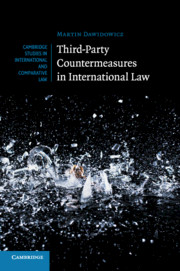Book contents
- Frontmatter
- Contents
- Foreword
- Preface
- Table of Cases
- List of Abbreviations
- 1 Introduction
- 2 Third-Party Countermeasures and the ICJ
- 3 Third-Party Countermeasures in the ILC
- 4 Third-Party Countermeasures in State Practice
- 5 Permissibility of Third-Party Countermeasures: Evaluation
- 6 Third-Party Countermeasures and Safeguards against Abuse
- Conclusion
- Bibliography
- Index
- Miscellaneous Endmatter
1 - Introduction
Published online by Cambridge University Press: 01 June 2017
- Frontmatter
- Contents
- Foreword
- Preface
- Table of Cases
- List of Abbreviations
- 1 Introduction
- 2 Third-Party Countermeasures and the ICJ
- 3 Third-Party Countermeasures in the ILC
- 4 Third-Party Countermeasures in State Practice
- 5 Permissibility of Third-Party Countermeasures: Evaluation
- 6 Third-Party Countermeasures and Safeguards against Abuse
- Conclusion
- Bibliography
- Index
- Miscellaneous Endmatter
Summary
The Object of the Study
Modern international law has witnessed the emergence of a fledgling multilateral public order based not so much on logic as ‘some mixture of hope and experience’. Indeed the general life of the law in the international system (as in the municipal system) is not logic but experience – even if, in this particular case, the amount of that experience is limited and mixed with a great deal of hope. The construction of a multilateral public order is based on the hope that law – more precisely, the law of State responsibility – would come to play an increasingly important role in the settlement of collective problems. Experience nonetheless shows that tools of communitarian law enforcement are limited and highly contested. Moreover, even insofar as they do exist, they are rarely used. So has this multilateral construction been based merely on normative means? Might Shakespeare's King Claudius have exclaimed, ‘My words fly up, my thoughts remain below: Words without thoughts never to heaven go’? What – if anything – can States do ‘between war and words’ in defence of multilateral public order when confronted with massive human rights violations and other international crises?
Judicial or quasi-judicial means of settlement – even when available under human rights treaties – are rarely (if ever) used. The inter-State complaint procedure under Article 41 ICCPR has never been used and remains a dead letter: the enforcement mechanism in the ICCPR appears to be in serious need of CPR. What is more, even if somehow resuscitated, it is no Sleeping Beauty: the ‘sad reality’ is that enforcement mechanisms in many human rights treaties are optional, cumbersome and ineffective. As for the ICJ, States have rarely knocked on the door of the Court to enforce a communitarian norm, and even when they have done so, the Court has been reluctant to open it. Indeed the ICJ has only once opened its door to a claim involving the enforcement of a communitarian norm. The Grotian notion of humanitarian intervention – whatever its pre-Charter status – is widely regarded today as unlawful. The notion of the responsibility to protect is little more than a rhetorical device.
- Type
- Chapter
- Information
- Third-Party Countermeasures in International Law , pp. 1 - 35Publisher: Cambridge University PressPrint publication year: 2017

